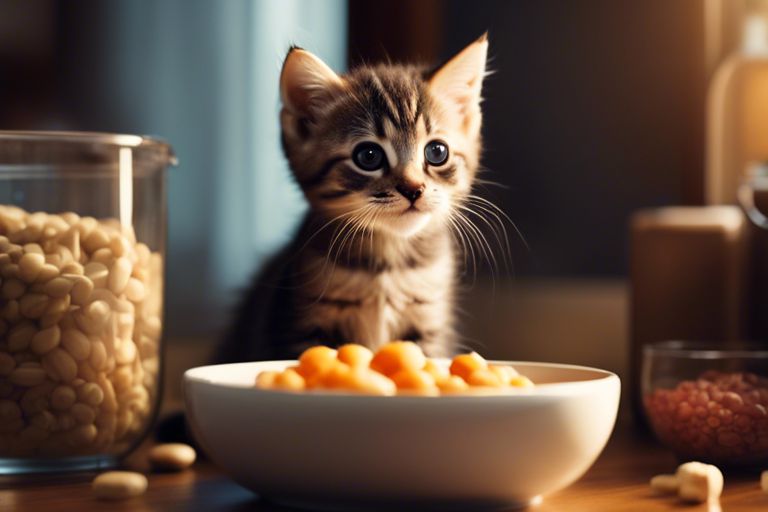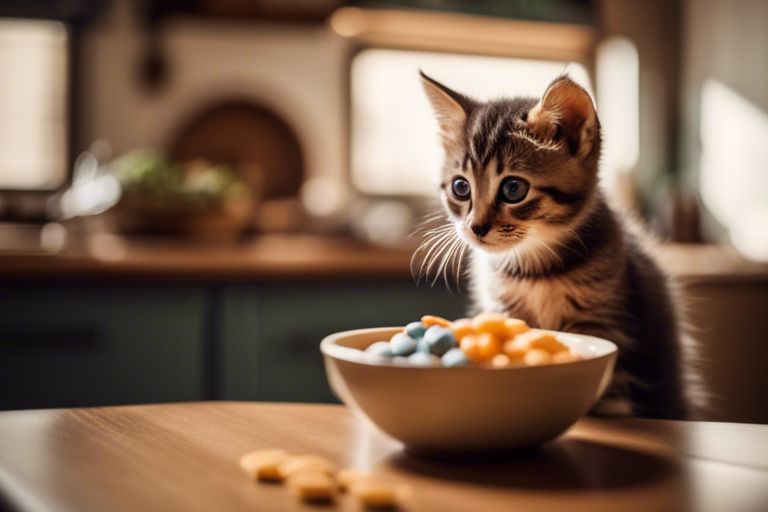Many new kitten owners are often unsure about the best nutrition for their tiny feline companion. Ensuring your kitty has a well-balanced diet is crucial for their overall health and development. In this comprehensive guide, we will explore everything you need to know about kitten nutrition, from choosing the right food to understanding the dietary needs of your growing furball. By following these expert tips, you can provide your kitten with the best possible start in life and set them up for a lifetime of good health and happiness.
Understanding Kitten Nutrition
Types of Nutrients Essential for Kittens
A well-balanced diet is crucial for the healthy growth and development of kittens. There are several imperative nutrients that kittens require to thrive, including proteins, fats, carbohydrates, vitamins, and minerals. Proteins are vital for muscle development, fats provide energy, carbohydrates serve as a source of energy, vitamins play a role in various bodily functions, and minerals are imperative for overall health. Ensuring that your kitten receives the right balance of these nutrients is key to their well-being.
| Proteins | Muscle development |
| Fats | Energy source |
| Carbohydrates | Energy source |
| Vitamins | Various bodily functions |
| Minerals | Overall health |
The proper balance of these nutrients is crucial for the healthy growth of your kitten. The types and amounts of nutrients needed may vary depending on the kitten’s age, breed, and overall health. The key is to provide a well-rounded diet that meets all of your kitten’s nutritional needs. The appropriate balance will help ensure that your kitten grows into a healthy and happy adult cat.
Factors Affecting Kitten Nutrition
Assuming your kitten’s nutrition needs are solely based on their age could be a common misconception. Factors such as breed, activity level, health status, and reproductive status can all play a role in determining the nutritional requirements of a kitten. Recognizing these factors is imperative in tailoring a diet that meets your kitten’s specific needs. Note, every kitten is unique, and their nutritional needs may vary.
- Breed
- Activity level
- Health status
- Reproductive status
- Individual preferences
Clearly understanding the factors that influence your kitten’s nutrition requirements is imperative for providing them with the best care possible. By taking into account these factors, you can tailor their diet to ensure they receive the right balance of nutrients for optimal growth and development. Recognizing and addressing these factors will help you raise a healthy and happy kitten.

Choosing the Right Food for Your Kitten
Pros and Cons of Wet vs. Dry Food
| Wet Food | Dry Food |
| Higher moisture content | Convenient for free-feeding |
| Rich flavor and aroma | Promotes dental health |
| Easier for kittens to eat | Longer shelf life |
| Less processed | More affordable |
On the debate between wet and dry kitten food, each type comes with its own set of advantages and drawbacks. Wet food is typically preferred for its higher moisture content and palatability, making it easier for kittens to eat. On the other hand, dry food is convenient for free-feeding and can help promote dental health. Consider your kitten’s specific needs and preferences when choosing between the two options.
Tips for Reading and Understanding Food Labels
- Look for named protein sources as the first ingredient
- Avoid artificial colors and flavors
- Check for important nutrients like taurine and omega-3 fatty acids
Little details on food labels can provide valuable insights into the quality and nutritional value of kitten food. Ensure the food you choose meets the specific dietary requirements of your kitten. Thou, understanding food labels is crucial in making informed decisions about your kitten’s nutrition.
Conclusion: With respect to choosing the right food for your kitten, consider factors such as moisture content, ingredients, and your kitten’s individual preferences. Balance is key in providing a well-rounded and nutritious diet for your furry friend.
Step-by-Step Guide to Feeding Your Kitten
| Feeding Routine | Portion Control and Growth Milestones |
How to Establish a Feeding Routine
Any cat parent knows that establishing a feeding routine is crucial for a kitten’s development. Begin by feeding your kitten at the same times each day, offering a balanced diet of high-quality kitten food. Make sure to provide fresh water at all times and monitor your kitten’s appetite and weight to adjust their portions accordingly.
Portion Control and Growth Milestones
On the journey of nurturing your kitten, it is vital to practice portion control to prevent overfeeding. Kittens grow rapidly in their first year, so it’s vital to monitor their weight and adjust food portions accordingly. Be mindful of growth milestones and consult with your veterinarian to ensure your kitten is developing at a healthy pace.
Plus, remember that every kitten is unique, so it’s important to tailor their feeding plan to their individual needs. By providing the right nutrition and monitoring their growth, you can help your kitten thrive into a healthy and happy cat.

Advanced Nutrition Tips
Keep your kitten healthy and happy with these advanced nutrition tips:
- Supplements and Vitamins: Are They Necessary?
Tip: Talk to your veterinarian before giving your kitten any supplements or vitamins. Reason: Kittens usually receive all the necessary nutrients from a balanced diet, and giving them supplements without professional guidance can lead to imbalances and health issues. - Dealing with Special Dietary Needs and Allergies
Allergies
Tips
When dealing with special dietary needs and allergies in your kitten, it is important to consult with a veterinarian to determine the best course of action. Your vet may recommend an elimination diet to identify the specific allergen or provide guidance on suitable alternative food options.
Allergies
Plus, pay attention to any symptoms such as vomiting, diarrhea, or skin issues that could indicate an allergy. By working closely with your vet, you can ensure that your kitten receives the proper nutrition while managing any dietary restrictions or allergies effectively.
Conclusively
As a feline enthusiast, ensuring your kitten receives the proper nutrition is necessary for their overall health and well-being. This ultimate guide has equipped you with valuable insights on the nutritional needs of kittens, from choosing the right food to understanding how to read labels. By implementing the tips and recommendations provided, you can help your kitten thrive and grow into a healthy adult cat. Bear in mind, a balanced diet is key to a happy and energetic furry friend. Keep in mind the information shared here as you commence on this exciting journey of caring for your beloved kitten.




